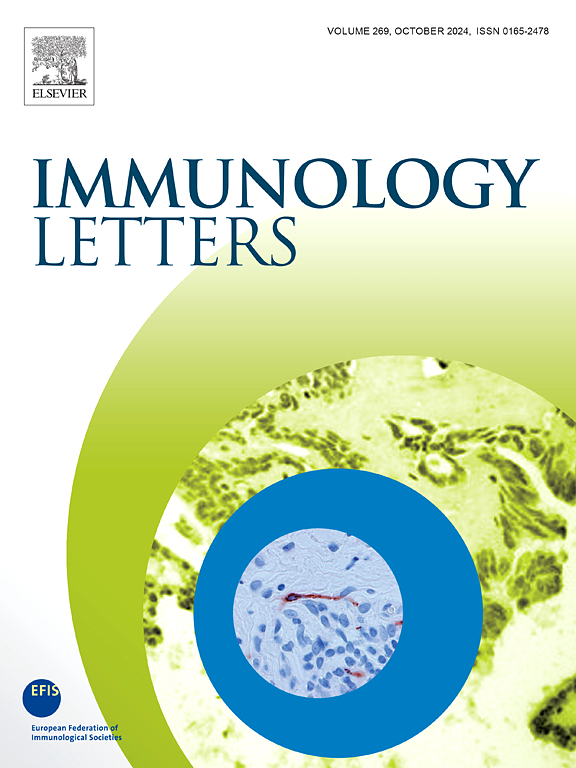在Vedolizumab治疗失败后,S100A9作为诊断和治疗克罗恩病的靶点的鉴定
IF 2.8
4区 医学
Q3 IMMUNOLOGY
引用次数: 0
摘要
vedolizumab药物是精确针对克罗恩病(CD)肠道的治疗方法。它可以抑制淋巴细胞向肠道部位的迁移,尽管事实上很大一部分人群仍然得不到有效治疗。在这项研究中,从对维多单抗治疗无反应或有反应的CD患者中取样的外周血白细胞用于转录组测序。利用转录组测序和GSE191328获得的交叉差异表达mRNA来预测关键的治疗靶点。生物信息学分析用于探索潜在的生物学机制和筛选关键基因。S100A9抑制剂可增加结肠炎小鼠的体重和结肠长度,降低DAI评分。我们的研究还表明,抗α4β7整合素抗体联合S100A9抑制剂可进一步缓解结肠炎。流式细胞术发现,灌胃S100A9抑制剂paquinimod后,结肠组织免疫细胞群的组成发生了变化。重要的是,阻断S100A9抑制了小鼠结肠中性粒细胞的募集。我们的发现为进一步探索对vedolizumab无反应的CD患者的新靶点奠定了基础。本文章由计算机程序翻译,如有差异,请以英文原文为准。
Identification of S100A9 as a target for diagnosis and treatment of Crohn’s Disease after Vedolizumab treatment failure
The vedolizumab medication is the treatment that precisely targets the gut for Crohn’s Disease (CD). It can inhibit the migration of lymphocytes to the intestinal site despite the fact that a significant portion of the population continues to be ineffectively treated. In this study, peripheral blood leukocytes sampled from the CD patients who are nonresponsive or responsive to vedolizumab treatment were used for transcriptome sequencing. Intersected differentially expressed mRNA obtained from transcriptome sequencing and GSE191328 were utilized to predict key therapeutic targets. Bioinformatics analyses were used to explore potential biological mechanisms and to screen pivotal genes. Inhibitor of S100A9 increased the body weight and colon length of mice with colitis, and decreased the DAI score. Our study also demonstrated that the combination of anti-α4β7 integrin antibody with inhibitor of S100A9 further alleviates colitis. Through flow cytometry, changes in the composition of immune cell populations in colon tissues were found after intragastric administration of paquinimod, an inhibitor of S100A9. It is important that blocking S100A9 inhibited the recruitment of neutrophils in the mice’s colon. Our findings lay a foundation for the further exploration of the new targets for non-responders to vedolizumab in CD patients.
求助全文
通过发布文献求助,成功后即可免费获取论文全文。
去求助
来源期刊

Immunology letters
医学-免疫学
CiteScore
7.60
自引率
0.00%
发文量
86
审稿时长
44 days
期刊介绍:
Immunology Letters provides a vehicle for the speedy publication of experimental papers, (mini)Reviews and Letters to the Editor addressing all aspects of molecular and cellular immunology. The essential criteria for publication will be clarity, experimental soundness and novelty. Results contradictory to current accepted thinking or ideas divergent from actual dogmas will be considered for publication provided that they are based on solid experimental findings.
Preference will be given to papers of immediate importance to other investigators, either by their experimental data, new ideas or new methodology. Scientific correspondence to the Editor-in-Chief related to the published papers may also be accepted provided that they are short and scientifically relevant to the papers mentioned, in order to provide a continuing forum for discussion.
 求助内容:
求助内容: 应助结果提醒方式:
应助结果提醒方式:


